Gender Project - Papua New Guinea
Summary
Project
Kamap Man Tru Men's Health and Gender Program
Timeframe
2009 to date
Partners
Susu Mamas Inc (2016 - current)
Population Services International (2014-16)
Papua New Guinea Family Health Association (2009-14)
Location
East Sepik, West New Britain, Morobe, Eastern Highlands and Western Highlands, Papua New Guinea
Direct beneficiaries
12,604
Progress
The Kamap Man Tru Health and Gender Program works at a community level to raise awareness and support positive change amongst males and females to improve gender equality, reproductive and sexual health and related behaviours and to challenge the accepted norms of gender violence.
The program is currently working in the Eastern and Western Highlands and the Morobe Province.
This program has evolved over time commencing as a men's behaviour change program in 2009 with the aim to enable men to have greater understanding and awareness of their role in supporting family and community health.
An evaluation in 2012 saw the program redeveloped into a peer education model for use at community level. Volunteer peer educators were trained to conduct community education and one-to-one sessions with men to discuss a variety of issues including sexual health, domestic violence, family dynamics, planned parenthood and conflict resolution. To support the process a participatory community level teaching tool - the Men's Health and Gender Manual - was developed and made available in both English and Tok Pisin.
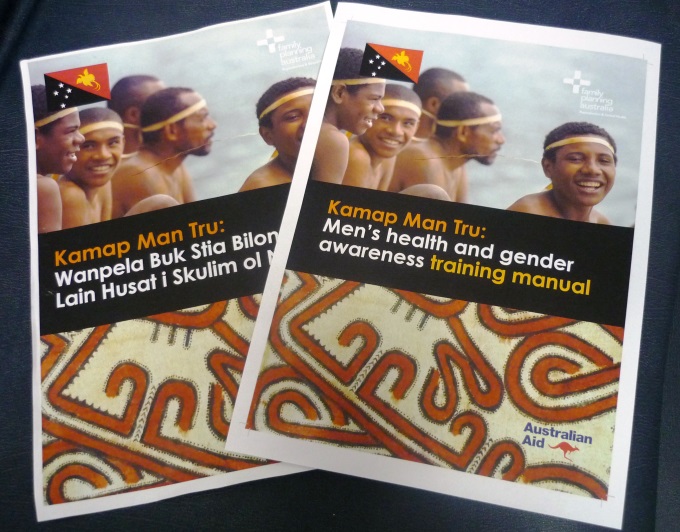
Between July 2015 and June 2017, a pilot program employing local male volunteer peer educators in remote areas in Morobe Province was implemented to trial and evaluate the efficacy of the peer education model using an evidence based approach. The evaluation of the program helped inform the next phase. A key learning was the need to integrate women into the program.
In July 2017 a second phase commenced in the Timini LLG of Mumeng, utilising a new approach integrating Susu Mamas clinical outreach program with the community engagement model. This strategy, working with both men and women, combines three elements:
- strengthening the community to take on a community program through the Healthy Islands, Community Action and Participation (CAP) program
- selection by the community of the Village Health Volunteers (formerly Peer Educators) and
- training of the Village Health Volunteers in the revised National Village Health Volunteers Program and Kamap Man Tru Program. Tools in Tok Pisin are provided to the Village Health Volunteers for use in their community education sessions. During 2017-18, 924 people were reached in this way with health education
In 2018-19 the Project Officer continues to work with the community and the Village Health Volunteers in Timini to support and monitor the program's progress. At the same time the program is expanding to Tarabo Aid Post, Okapa District, Eastern Highlands Province and Kagamuga community in the Western Highlands.
Through the program, Timini Community now has a Community Health Committee made up of Village Health Volunteers, community leaders, Aid Post Health worker and a Susu Mamas representative.The committee has merged with the Timini Disaster Committee and together they are assessing and reviewing the health needs with the community. One of their first actions is the development of the fresh water pipeline into the community, a project supported by the International Organisation for Migration.
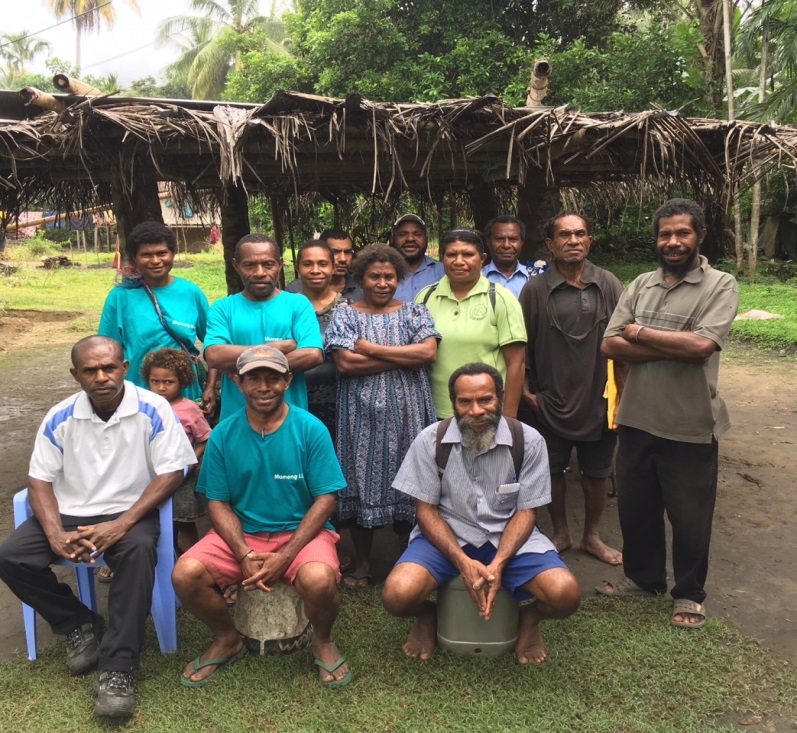
The Village Health Volunteers are actively raising health awareness in the community and referring patients to the health centre as needed. They are working together and with the support of the community and Susu Mamas to ensure that their village is a healthy village.
Case study: 'Kamap Man Tru' in Tok Pisin means 'Becoming a Real Man'
This story was told to the program coordinator when she visited the community where a peer educator lived. The wife of the peer educator said he was 'a drunkard' and violent man before. His home had never had peace when he was drunk before attending the Kamap Man Tru Peer Educators training workshop. After the training the man changed enormously. He reduced alcohol consumption and socialising with friends for drinking and remained at home most of the evenings and weekends to help his wife out with housework such as cooking, doing dishes, washing children and washing clothes. On the second monitoring visit by the program coordinator, she heard that a significant change had occurred. The peer educator had built a new kitchen (haus kuk) for himself and his family. Prior to having that new kitchen, the peer educator and his family members use to cook with his parents in the same kitchen and share food from one pot resulting in the wife and children not eating enough due to the large number of family members sharing the same pot of food.
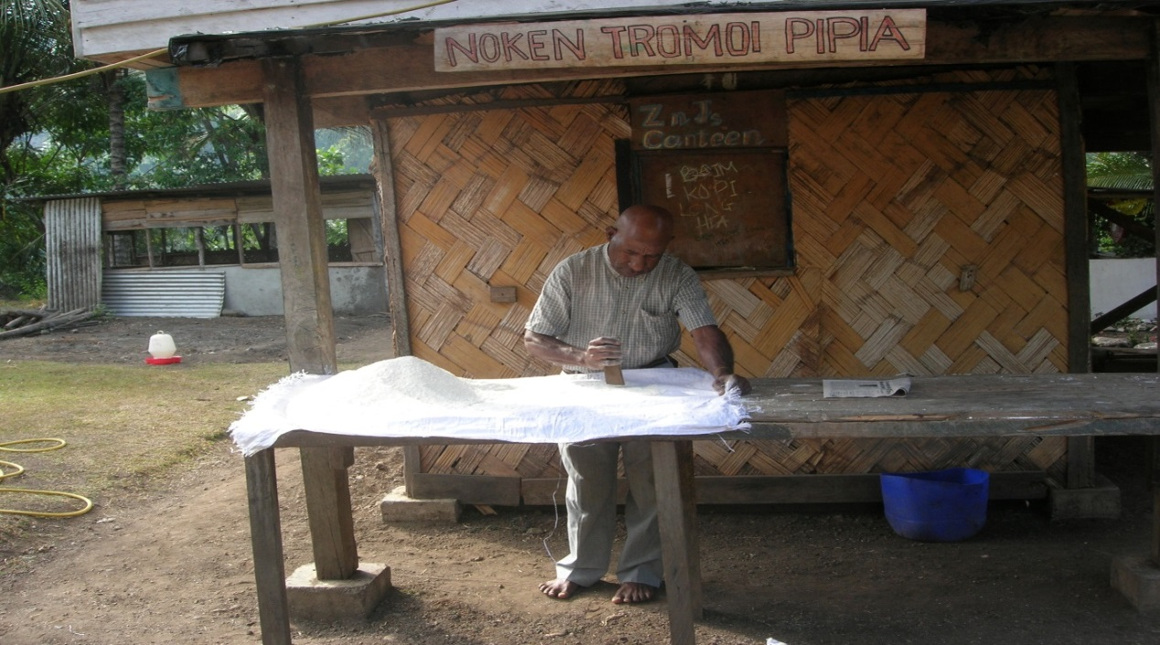
Man helping with pounding wheat into flour in preparation for baking, this is normally a woman's task.
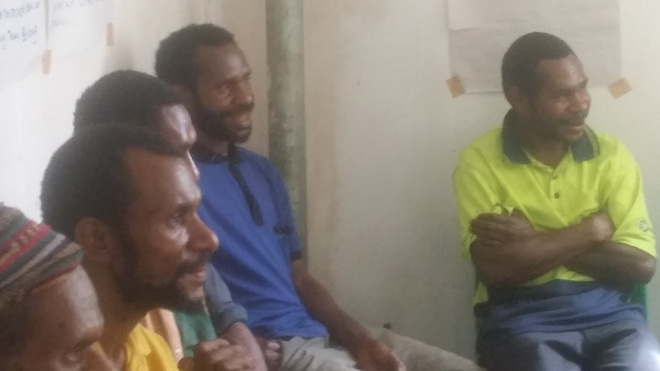
Men learning

It takes a village to raise a family
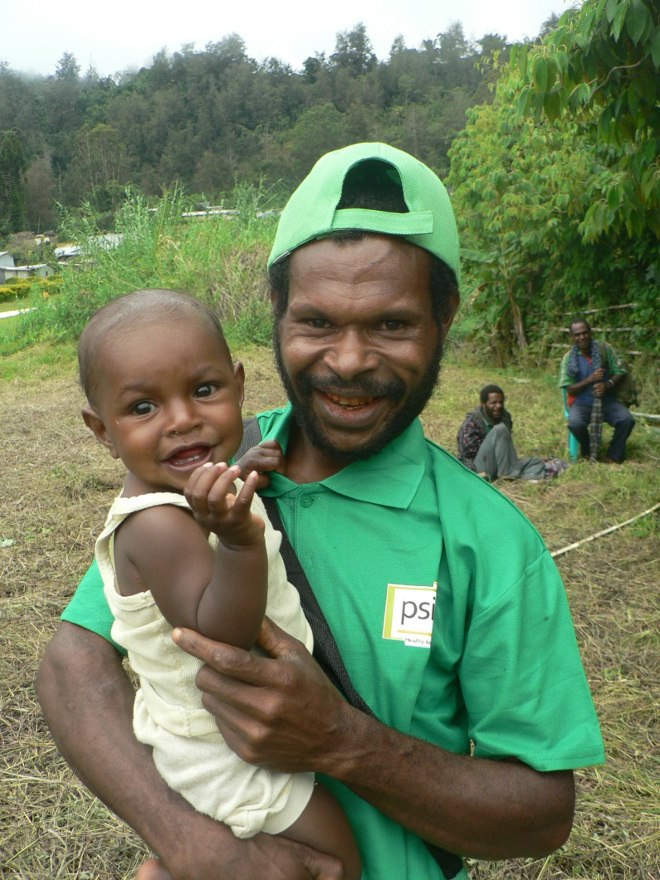
A happy family



